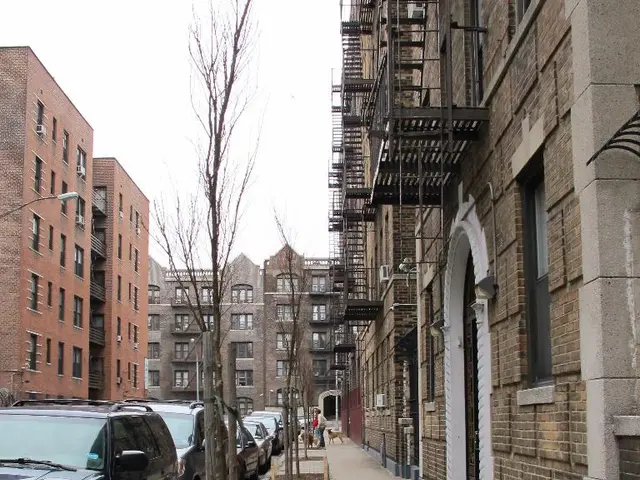Controversial School Board Faces Legal Action for Disciplining Parent over Labeling Trans Athlete as Tall Male
In the current climate, school boards are drawing intense scrutiny for their militant defense of transgender activism. This defense disregards the majority of Americans who reject this ideology. A prime example comes from a federal lawsuit filed by the Institute for Free Speech, supporting a parent, Beth Scaer, who spoke up against male athletes competing in girls' high school sports.
At her school board meeting in 2024, Scaer mentioned a male athlete as a "tall boy." The school board promptly cut her off, threatening police action for violating a vaguely-defined policy on "derogatory comments." Why the heavy-handed response? Just for acknowledging a biological reality!
Stack the deck in favor of transgender athletes, and suddenly the truth is considered... "derogatory."
Never one to back down, Scaer took a stand. This week, the Institute for Free Speech and local counsel Roy S. McCandless filed a federal lawsuit in the U.S. District Court for the District of New Hampshire against the Kearsarge Regional School Board.
The Institute for Free Speech’s press release states that the school board is using these “derogatory comments” rules to silence and suppress opposing voices in controversial matters.
When Scaer dared to speak out at the August 2024 meeting, Board Chair Alison Mastin halted her within seconds, threatening police interference because Scaer correctly labeled a transgender athlete as a boy. Meanwhile, those speakers who supported the transgender athlete's participation were given their full three minutes or permitted to display supporting signs.
The lawsuit asserts that the policy is “unreasonable, vague, and overbroad.” Nathan Ristuccia, an attorney at the Institute for Free Speech, expressed that such rules infringe upon the First Amendment:
"School boards cannot invent arbitrary speech rules on a whim to restrict opinions they don't like. This 'derogatory' statements rule gives the board ultimate power to determine what speech is accepted and what isn't—precisely what the First Amendment is designed to prevent."
Scaer added, "Every citizen deserves an equal opportunity to address their elected officials without fear of censorship. This case is about ensuring that all citizens—regardless of their viewpoint—can participate in public meetings and comment on issues vital to our community."
The Kearsarge School Board, displaying its extremism, disregarded New Hampshire's Fairness in Women's Sports Act by allowing the male athlete to compete.
Ristuccia shared his insight with our website, explaining why this suit is vital:
"When government officials censor citizens based on subjective rules, labeling dissenting opinions as 'derogatory,' they're not just infringing upon the First Amendment. They're undermining our nation's fundamental principle of republican governance. Free and equal public debate on contentious issues is what the First Amendment was designed to protect."
This case reveals how facile it is for rogue administrators to enforce their warped viewpoints—derived directly from activist handbooks—to silence opposing viewpoints, even if those viewpoints represent irrefutable truths. Let's hope other lawsuits stand firmly against such oppressive actions.
Sources:1. Confused and Confounded: The Misguided Attempt to Rewrite Prohibiting ‘Derogatory’ Speech2. A War on Women: How Political Correctness Ignored, Mocked, and Attacked the Victims of the Pennsylvania Locker Room Peeping Tom, and the District’s Decision to Allow Male Students in Girls’ Sports3. Bethel School District v. Fraser4. The First Amendment Does Not Protect Lewd Speech at School5. Tinker v. Des Moines independent School District
Further Reading:- The First Amendment Protects Derogatory Speech, Especially When It’s Critical of a Public Official- The Perils of Censoring “Derogatory” Speech- Let Parents Speak! A Case for Protecting First Amendment Rights in School Boards Meetings- Why Free Speech Matters in Schools
TIP: The Supreme Court's decision in Tinker v. Des Moines affected student speech rights in public schools, but its impact on public meetings remains limited. The court in Matal v. Tam ruled that the First Amendment's free speech clause protects even offensive speech, butтиthese cases primarily focused on government censorship, and their application to school boards' speech regulations can be debated. For a comprehensive understanding, consider studying legal precedents and their implications in various contexts.
In this context, the Institute for Free Speech's press release indicates that the Kearsarge Regional School Board's "derogatory comments" rules are being used to silence and suppress opposing voices in contentious matters, such as education-and-self-development (specifically, the inclusion of transgender athletes in girls' high school sports). Furthermore, Nathan Ristuccia, an attorney at the Institute for Free Speech, argues that such rules infringe upon the First Amendment's protection of free speech, as they give the board ultimate power to determine what speech is accepted and what isn't—precisely what the First Amendment is designed to prevent. This suggests a potential overlap between politics and education, as school boards wield significant power to regulate speech, especially in the realm of general-news topics like transgender activism and girls' high school sports.







